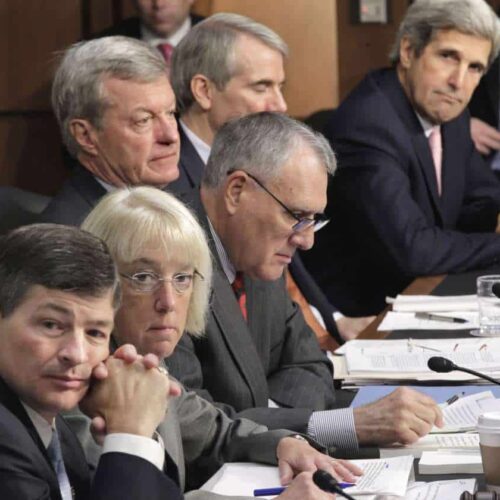Introduction
Members of the congressional Super Committee have received more than $300,000 from 93 special interests in just six weeks since they were appointed, according to an analysis of FEC data by iWatch News. More than a third of the money came from health-related interests as the committee of 12 debates serious cuts to Medicare and Medicaid.
The donations from political action committees slightly favored the Republicans on the panel (officially titled the Joint Select Committee on Deficit Reduction; unofficially dubbed the Super Congress). Republicans got 84 donations for $181,000; Democrats received 63 donations totaling $121,000.
The analysis covered Aug. 11, the day the committee was formally announced, through Sept. 30, the end of the third quarter reporting period. And those dollar amounts will likely increase when the Senate contributions, which are not filed electronically, are submitted to the FEC.
Formed as part of a compromise in late July between Republicans and Democrats in Congress, the committee faces a serious uphill task: they must come up with $1.5 trillion or more in budget savings, enough to match increases in the government’s ability to borrow enough money to pay its bills through the beginning of 2013. It requires a bipartisan majority of at least seven of the committee’s 12 members to recommend legislation to be presented to the whole Congress for an up-or-down vote by Dec. 23.
The select panel has until the day before Thanksgiving to finish its work.
As the committee seeks trillion-dollar spending cuts, interest groups have weighed in heavily with letters, lobbying efforts and, of course, campaign cash.
Of the 93 special interest groups who donated via their PACs to the members during this period, seven gave at least $10,000. They were:
- FedEx, the shipping giant — $10,500
- Pfizer, the pharmaceutical manufacturer — $10,000
- The National Beer Wholesalers Association, a trade association for beer companies — $10,000
- The American Dental Association, the trade association for dentists around the nation — $10,000
- Walt Disney Productions, the entertainment conglomerate — $10,000
- Chevron, the oil giant — $10,000
- The Associated General Contractors of America, the trade association of the construction industry — $10,000
- Fresenius Medical, a major dialysis provider— $10,000
A mix of health and pharmaceutical companies made up at least $111,500 of the donations, by far the biggest business sector. One focus of the Super Committee is to find ways to save money on health care, which many have speculated means potential cuts into Medicare and Medicaid.
Fresenius Medical provides a good example for how companies may be attempting to influence the Super Committee members. Fresenius is one of the largest dialysis providers in the world, operating over 1,800 clinics in the U.S. alone.
With the number of Medicare patients receiving dialysis (and, accordingly, the Medicare expenses for renal disease treatment) going up in recent years, the reimbursement rules and procedures for these treatments have already been a hot topic among those seeking to improve Medicare. A CMS rulemaking process is already under way for a quality incentive program. Should the Super Committee propose changes to Medicare, Fresenius and other dialysis companies could see a major impact to their bottom lines.
In the six weeks since the committee was announced, Fresenius made three donations to committee members Reps. Chris Van Hollen ($1,000) and Jim Clyburn ($5,000), along with Sen. Max Baucus ($4,000). The last time the company had donated to either Van Hollen or Clyburn was in June of 2008; in January of this year the company gave $5,000 to Baucus’ Glacier PAC.
Fresenius is a member of the Kidney Care Partners trade group and donated $5,000 in June to the group. Abbott Laboratories, another member in the kidney association, made six donations for $7,500 to Super Committee members during this time period.
Shortly after the Super Committee was launched, Kidney Care Partners wrote a letter to the committee, urging Congress to allow kidney patients enrolled in the new health exchanges to have their dialysis paid for by private, primary insurance for up to 30 months. Currently, when a patient is diagnosed with kidney failure, they are automatically enrolled in Medicare, regardless of age. “It is incumbent upon all Americans to work towards a more cost efficient and intelligent health care system,” reads the letter. “Public health care dollars are precious and should be wisely and efficiently spent.”
Kidney Care Partners spokesman John Jonas said Medicare cuts affect the dialysis industry more than other areas because upwards of 80 percent of its business is from Medicare. “We feel Medicare cuts very strongly. We’re particularly vulnerable, and there’s no alternative.”
Jane Kramer, vice president for public affairs and communications at Fresenius, told iWatch News in a statement that the company “frequently engages members of Congress and Administration representatives to ensure that they understand the unique nature of dialysis and the various issues that impact the treatment of individuals with end stage renal disease.”
“By engaging with policy makers directly, we are able to provide them with a perspective to which they may not otherwise have access. In turn, this helps better inform their decisions on critical issues such as access to quality care for all Americans, including those with chronic kidney disease,” the statement said.
Not all members of the committee are raising big bucks around their committee membership. Sen. John Kerry, a Massachusetts Democrat, promised last month that he would raise no money until the committee’s work is completed in late November. Meanwhile, Sen. Jon Kyl announced in February that he will not seek re-election when his term ends in 2012.
Total received from PACs to Super Committee members, 8/11-9/30:
- Rep. Dave Camp, R-Mich. — $90,000
- Rep. Xavier Becerra, D-Calif. — $38, 500
- Rep. Jim Clyburn, D-S.C. — $36,500
- Rep. Fred Upton, R-Mich. — $36,150
- Sen. Max Baucus, D-Mont. — $29,000*
- Rep. Jeb Hensarling, R-Texas — $22,500
- Sen. Pat Toomey, R-Pa. — $18,000*
- Rep. Chris Van Hollen, D-Md. — $17,500
- Sen. Rob Portman, R-Ohio — $10,000*
- Sen. John Kyl, R-Ariz. — $5,000*
- Sen. Patty Murray, D-Wash. — $0*
- Sen. John Kerry, D-Mass. — $0**
*Senate numbers still coming in
**Promised not to raise money while on Committee; returned two donations made during that time
Read more in Money and Democracy
Money and Democracy
FACT CHECK: Biden inflates Michigan crime figures
On a U.S. tour promoting the American Jobs Act, Biden bungles a few statistics on crime, sexual assualt
Money and Democracy
FACT CHECK: GOP tackles the 9-9-9 tax plan, immigration in Las Vegas debate
Western debate between Republican presidential nominees grows feisty



Join the conversation
Show Comments